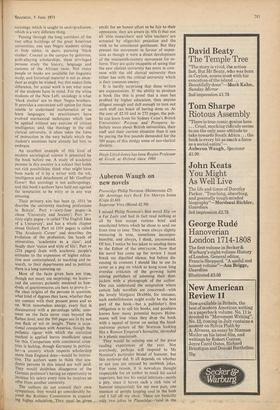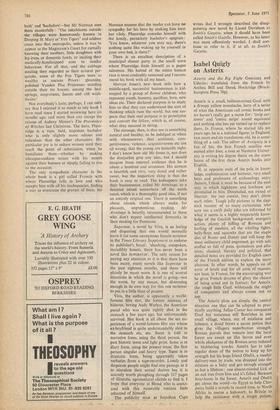Auberon Waugh on new novels
Superstar Viva (Blond £2.50)
I missed Philip Norman's first novel Slip on a Fat Lady and had in fact read nothing at all by him except various brief and unsolicited letters which he chose to send me from time to time. They were always slightly menacing in tone, sometimes incompre- hensible, and always, I think, unanswered. Of late, I notice he has taken to sending them to the Editor of the SPECTATOR. Now that his novel has come up for review I must break my dignified silence, but before dis- cussing its contents I should like to use its cover as a peg on which to hang some long overdue criticism of the growing habit among publishers of adorning their dust- jackets with a photograph of the author. One can understand the temptation where certain lady novelists are concerned--with the lovely Margaret Drabble, for instance, such embellishment might easily be the best part of the book—but a publisher's first obligation is to sell his books, and goodness knows how many potential buyers Heine- mann will lose when they drop the book with a squeal of terror on seeing the head- and-torso picture of Mr Norman looking like a Roman Emperor's favourite, shrouded in a plastic macintosh. " They would be missing one of the great reading experiences of the year. Not everybody, perhaps will respond to Mr Norman's particular brand of humour, but this reviewer did. It all depends on whether or not you are amused by snobbish jokes. For some reason, it is nowadays thought respectable for an author to mock his social superiors, but not his social inferiors—surely a pity, since it leaves such a rich vein of humour unquarried; for my own part, one mention of people keeping coal in the bath and I fall off my chair. There are basically only two jokes in Pluntridge—`coal in the
bath' and 'bachelors'—but Mr Norman uses them masterfully : 'The inhabitants outside the villages were humorously known in Deeping St Mary as"Fen Tigers" and seldom came into that metropolis, unless it was to appear at the Magistrate's Court for carnally knowing their mothers, little daughters with leg-irons or domestic fowls, or inciting their medically-handicapped sons to similar behaviour. For all that, and the cabbage stealing they regarded as their natural per- quisite, some of the Fen Tigers were as wealthy as ancient Priors: gleaming, polished Vanden Plas Princesses standing outside their tin houses, among the bed- springs, soup-crates, faeces and old wash- basins.'
Not everybody's taste, perhaps. I can only say that I enjoyed it as much as any book I have read since I started reviewing here six months ago, and more than any except the reissue of Aubrey Menen's The Prevalence of Witches last Christmas. The hero, Plum- ridge is a vain, bald, impotent bachelor who is only slightly more odious and ridiculous than the other characters. His particular joy is to seduce women until they reach the point of submission, when he humiliates them—whether by making whoopee-cushion noises with his mouth against their bosoms or simply failing to rise to the occasion.
The only sympathetic character in the whole book is a girl called' Francie with whom Plumridge falls in love and who accepts him with all his inadequacies, finding a way to overcome the gravest of them. Mr Norman ensures that the reader can have no sympathy for his hero by making him treat her vilely. Plumridge consoles himself with the lonely, pernickety bachelor's epigram: 'You know, whatever you may say, there's nothing quite like waking up by yourself in your own bed, is there?'
There is an excellent description of a municipal dinner party in the small town where Plumridge finds himself as a paper salesman. His hatred of the entire human race is most creditably sustained and I recom- mend his book with all my heart.
Mervyn Jones's new book tells how a middle-aged, successful businessman is kid- napped by a group of flower children, who represent youth, honesty, pacifism, love, new ideas etc. Their declared purpose is to study him so that they can understand the sort of thinking which runs the world, but one sus- pects that their real purpose is to proselytise and convert the fellow, which is, of course, what they succeed in doing.
The message, then, is that sex is something natural and healthy, to be indulged at whim with whomsoever; that ambition, com- petitiveness, violence, acquisitiveness etc are all wrong; that the young are basically right.
I don't know how old Mr Jones is, nor does the dustjacket give any idea, but I should imagine from internal evidence that he is about a hundred and seventeen. His sermon is heartfelt and very, very dated and rather sweet, but the important thing is that the book is easy to read. The kidnappers take their businessman, called Mr Armitage, to a deserted island somewhere off the north coast, which is a thoroughly good idea, if not an entirely original one. There is something about islands which always make for pleasant, unpretentious reading. Mr Armitage is heartily recommended to those who don't expect intellectual fireworks in their reading for Pentecost.
Superstar, a novel by Viva, is so boring and disgusting that one would normally leave it for some anonymous female reviewer in the Times Literary Supplement to endorse its publisher's boast : 'shocking, outspoken, incredibly honest, there has never been a
novel like SUPERSTAR'. The only reason for paying any attention to it is that there have
been many, many novels like Superstar in the past eighteen months, and there will plainly be many more. It is one of several directions in which the novel is going—not the worst, by any means, but distressing enough in its own way for this one reviewer to put in a little blast of protest.
Viva, the author, is apparently a world- famous film star, the former mistress of hideous, boring Andy Warhol, the American pseud who was quite rightly shot in the stomach a few years ago, but unfortunately survived. Her book is all about the sex ex- periences of a world-famous film star whose ex-boyfriend is quite understandably shot in the stomach etc, etc. Some is told in narrative form, using the third person, the past historic tense and light print. Some is in diary form, using the present tense, the first person singular and heavy type. Some is in dramatic form, being apparently taken verbatim from a tape-recorder. Lonely and desperate people might find one passage in it to stimulate their sexual desires but it is scarcely worth ploughing through 317 pages of illiterate, egomaniacal clichés to find it. I hope that everyone at Blond who is associ- ated with this miserable venture feels ashamed of himself.
The publicity man at Jonathan Cape
writes that I wrongly described the disap- pointing new novel by Lionel Davidson as Smith's Gazette, when it should have been called Smith's Gazelle. However, as his letter was most offensively worded, I shall con- tinue to refer to it, if at all, as Smith's Gazette.



































 Previous page
Previous page